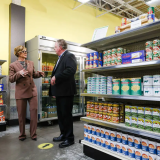In the News
March 26, 2024
...congressional leaders are mounting an effort to free up $45 million in the Colorado River Dam Fund that has been “inaccessible for decades due to bureaucracy and federal red tape.”
Issues:
Water
Energy & Public Lands
March 18, 2024
Catholic Charities of Southern Nevada will get much-needed upgrades thanks to $2.1 million in federal spending, Rep. Susie Lee, D-Nev., announced Monday.
Issues:
Appropriations
March 12, 2024
One thing they have in common: They're fed up with the party's leftward turn on immigration over the last decade...
March 6, 2024
Lee’s bill would provide funding for tutoring services, place aspiring educators into tutoring roles, and qualify those educators for college loan forgiveness.
Issues:
Students & Education
February 29, 2024
Nevada’s Democratic members of Congress joined federal legislation that would protect access to in vitro fertilization following last week’s Alabama Supreme Court decision that could impact access to the assisted reproductive technology.
Issues:
Health Care
February 19, 2024
Lee was No. 12 among 20 Democratic representatives who broke ranks with their party the most often.
KTNV: Springs Preserve Celebrates 15th Annual Black History Month Festival with music, art, and food
February 17, 2024
Congresswoman Susie Lee joined the festivities, emphasizing the importance of community and celebration in challenging times.
February 9, 2024
“I hike and bike through Red Rock Canyon every chance I get, and like many Nevadans, I’ve experienced firsthand how dangerous the aging Lost Creek boardwalk can be," said Congresswoman Susie Lee in a news release.
January 29, 2024
Lee said companies like Unimacts are helping Nevada make the transition to clean energy, a particularly crucial process for a city like Las Vegas, that is among the fastest-warming in the country.
January 25, 2024
LAS VEGAS (KSNV) — Congresswoman Susie Lee is expanding opportunities in solar infrastructure.



